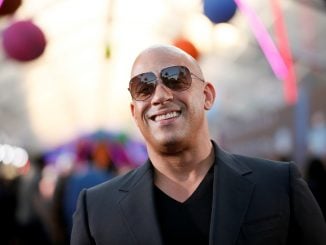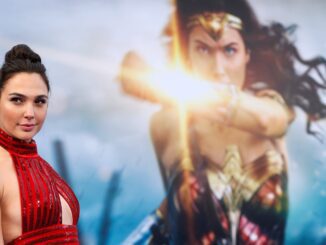
LOS ANGELES — Hey, comicbook fans, it’s another Thor movie, and that can only mean one thing: It’s almost time for another Avengers movie! While you wait, Disney and Marvel Studios hope to loot another half-billion dollars or so from the world’s wallets with this outlandish amuse bouche featuring the God of Thunder and his Abs of Steel, with yet another confusing plot crudely bastardized from Norse mythology in which most of the action takes place on a parallel world you care nothing about.
Like Thor’s two previous solo outings, this one is pretty much skippable, although it’s not without its pleasures — most notably, the fact that Thor’s not so solo this time around, with cameos/co-starring opportunities for the Hulk, Doctor Strange and a few leftover bits of Tony Stark’s wardrobe (including a retro Duran Duran T-shirt that’s good for a laugh). And while it’s not saying much, “Thor: Ragnarok” is easily the best of the three Thor movies — or maybe I just think so because its screenwriters and I finally seem to agree on one thing: The Thor movies are preposterous.
Rather than taking any of what happens seriously, co-writers Eric Pearson, Craig Kyle and Christopher L. Yost seem to have anticipated the film’s own “Mystery Science Theater 3000” track, incorporating self-aware punchlines throughout. The script pokes fun at the movie’s plot, production design, locations and past adventures. Heck, not even the obligatory cameo from Thor co-creator Stan Lee is sacred — identified here as the “creepy old man” who shears Thor’s tresses, resulting in a butch new rugby haircut.
Whereas the two previous Thor movies were somber battle epics directed by Kenneth Branagh (who attempted an awkward sort of pulp-Shakespeare hybrid) and Alan Taylor (a “Game of Thrones” helmer obsessed with making it gritty), respectively, the latest was clearly conceived as a wacky adventure comedy. Irreverent almost to the point of camp, that approach fits comfortably within the wheelhouse of Kiwi director Taika Waititi, for whom this undertaking was roughly 100 times the scale of his next most expensive production (cult hits “Hunt for the Wilderpeople” and “What We Do in the Shadows”).
Frankly, as heroes go, Thor is a big yawn: a virtually invincible guy with a hammer, built like a linebacker and woodenly played by the otherwise charismatic Chris Hemsworth (so great in “Rush” and last year’s “Ghostbusters”). Meanwhile, Waititi is someone worth celebrating: a small-time actor-director from far-away New Zealand who has leveraged a decade of eccentric, inventive indie features (many featured at Sundance) into a shot at helming one of the year’s biggest tentpoles. More heroic still, Waititi has managed to finally imbue Marvel’s dullest Avenger with a personality — even if said personality is little more than stony stoicism, best revealed in comedy riffs with hot-headed rival/ally the Hulk (Mark Ruffalo, whom we first meet trapped in mean, green, all-CG mode).
“Ragnarok” finds a creative way to pit these two Avengers against one another — later, once Hulk has mellowed into human form, they bicker over who’s the strongest — all of which is far more entertaining than watching them smash and hammer some generic CG adversary (although there’s plenty of that in the final act as well). It also re-reintroduces Thor’s troublemaking kid brother, Loki (Tom Hiddleston), who sorta-kinda helped prevent the nonsensical apocalypse of “Thor: The Dark World,” leaving everyone (but the audience) to think he had died a hero. And it even enlists yet another Oscar winner to the ensemble, casting Cate Blanchett as Hela, the older sister Thor never knew he had, and who now returns to enact an ancient Norse prophecy (hence, “Ragnarok”) that foretold an epic battle resulting in the death of many gods and the destruction of their realm.
Dressed in form-fitting black fetish gear and sporting a twisting, antler-spiked headdress, Blanchett looks like some sort of latter-day Maleficent and suggests how Marlene Dietrich or Barbara Stanwyck might have interpreted a Marvel villainess, throwing back her shoulders and playing to the camera. In her first encounter with her brothers, she demonstrates her awesome power by crushing Thor’s almighty hammer and banishing him to a distant trash planet while she sets about dismantling Asgard.
At the risk of mixing the DC and Marvel universes, Asgard is one of those places that, like Superman’s home planet of Krypton, exists to be destroyed, and Waititi’s challenge with “Ragnarok” is how to fulfill a prophecy and still make it feel like a happy ending. I’ll let you be the judge of how well he succeeds, since as far as I’m concerned, the less time spent on Asgard, the better (it’s basically an over-art-directed Maxfield Parrish painting, where the costumes are tacky and the extras always look bored). It’s a place that matters only to Odin (Anthony Hopkins), who’s apparently been doing oceanfront yoga against a greenscreen on earth since we last saw him.
At any rate, it’s no great loss that Hela is free to wreak havoc on Asgard while Thor and Loki are stranded on Sakaar, which is sort of an intergalactic trash dump where waylaid heroes are forced to compete in elaborate gladiator battles. So, while Thor preps to take on the arena’s reigning champion… (May I just interrupt myself to say how frustrating it is having to write about this garbage as if any of it makes sense or matters?) Suffice it to say, Jeff Goldblum pops up as the so-called “Grandmaster,” an effete emperor of some sort who seems to have taken makeup tips from Padme Amidala (incidentally, Natalie Portman had the good sense to sit out this “Thor” sequel).
Goldblum is actually the best thing about the movie, since he openly mocks the film’s underlying silliness — a pursuit in which he is ably assisted by Tessa Thompson, who plays a sarcastic, Han Solo-like renegade who first captures Thor, then later helps him to escape through the “Devil’s Anus.” Yes, that’s what the movie actually calls the gaping CG wormhole that connects Sakaar with “Ass-guard” (as the Grandmaster calls Asgard). Back in the day, audiences had to wait a few weeks for Mad magazine to skewer the latest self-important Hollywood blockbuster. These days, Marvel movies arrive as parodies of themselves. If only that were an indication of the genre’s own impending Ragnarok — a sign that the entire phenomenon is about to implode, only to be reborn as something more worthy of the audience’s time and intelligence.



